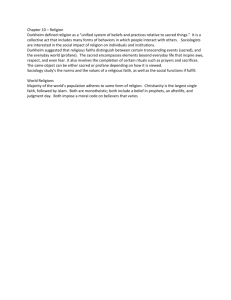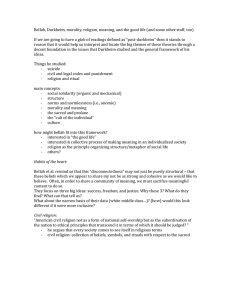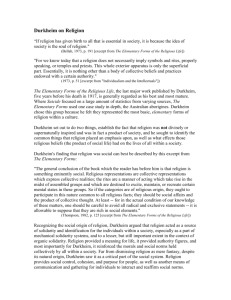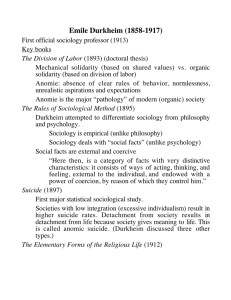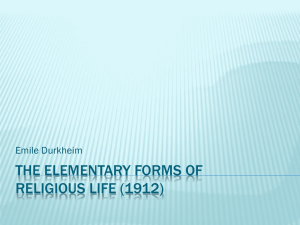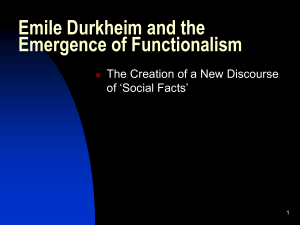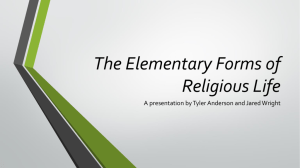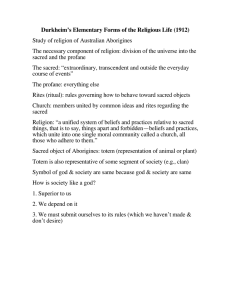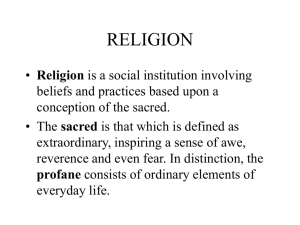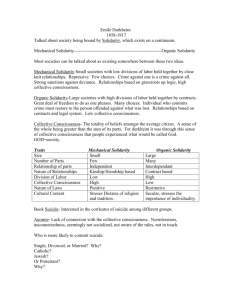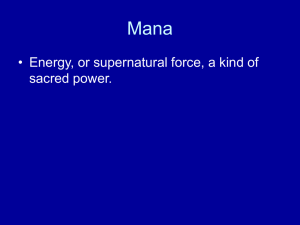Elementary Forms of Religious Life
advertisement
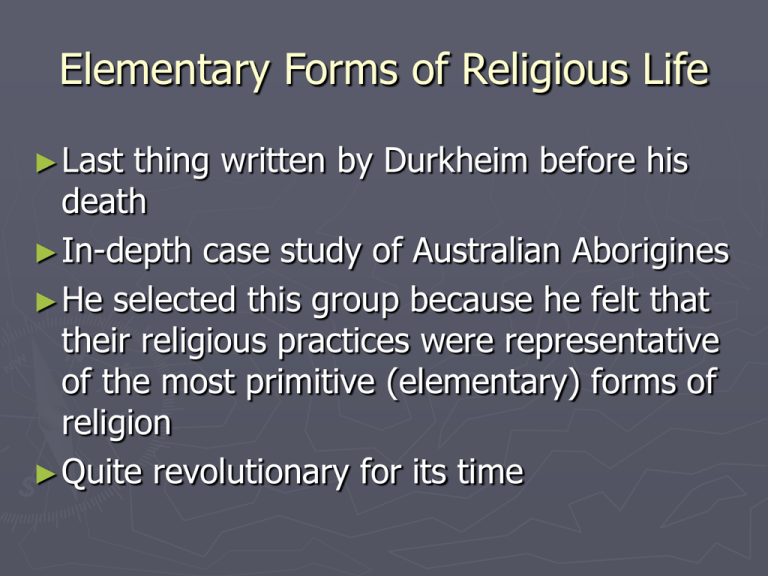
Elementary Forms of Religious Life ► Last thing written by Durkheim before his death ► In-depth case study of Australian Aborigines ► He selected this group because he felt that their religious practices were representative of the most primitive (elementary) forms of religion ► Quite revolutionary for its time ► "If religion has given birth to all that is essential in society, it is because the idea of society is the soul of religion." (Bellah, 1973, p. 191 [excerpt from The Elementary Forms of the Religious Life]) "For we know today that a religion does not necessarily imply symbols and rites, properly speaking, or temples and priests. This whole exterior apparatus is only the superficial part. Essentially, it is nothing other than a body of collective beliefs and practices endowed with a certain authority." (1973, p. 51 [excerpt from "Individualism and the Intellectuals"]) Main Points ► religion is not divinely or supernaturally inspired and is in fact a product of society ► sought to identify the common things that religion placed an emphasis upon, as well as what effects those religious beliefs (the product of social life) had on the lives of all within a society ► "The general conclusion of the book which the reader has before him is that religion is something eminently social. Religious representations are collective representations which express collective realities; the rites are a manner of acting which take rise in the midst of assembled groups and which are destined to excite, maintain, or recreate certain mental states in these groups. So if the categories are of religious origin, they ought to participate in this nature common to all religious facts; they should be social affairs and the product of collective thought. At least -- for in the actual condition of our knowledge of these matters, one should be careful to avoid all radical and exclusive statements -- it is allowable to suppose that they are rich in social elements." Social Origin of Religion ► Religion acts as a source of solidarity and identification for the individuals within a society ► Religion provides a meaning for life, it provides authority figures, and most importantly for Durkheim, it reinforces the morals and social norms held collectively by all within a society Lest we misunderstand ► Far from dismissing religion as mere fantasy, despite its natural origin, Durkheim saw it as a critical part of the social system. ► Religion provides social control, cohesion, and purpose for people, as well as another means of communication and gathering for individuals to interact and reaffirm social norms Sacred and Profane ► Durkheim's second purpose was in identifying certain elements of religious beliefs that are common across different cultures. ► A belief in a supernatural realm is not necessary or common among religions, but the separation of different aspects of life, physical things, and certain behaviors into two categories -- the sacred and the profane -- is common The sacred world cannot survive without the profane world to support it and give it life, and vice versa ► Finally, religion has a euphoric function in that it serves to counteract feelings of frustration and loss of faith and certitude by reestablishing the believers' sense of well-being, their sense of the essential rightness of the moral world of which they are a part. ► By countering the sense of loss, which, as in the case of death, may be experienced on both the individual and the collective level, religion helps to reestablish the balance of private and public confidence. ► On the most general plane, religion as a social institution serves to give meaning to man's existential predicaments by tying the individual to that supra-individual sphere of transcendent values which is ultimately rooted in his society. to the Institute for Social Research at the University of Michigan ► According The United States has a higher level of church attendance than any other country which is "at a comparable level of development." 53% of Americans consider religion to be very important in their lives. This compares with 16% in Britain, 14% in France and 13% in Germany. ►The importance of religion has been declining in developed countries. In those countries which are "experiencing economic stagnation and political uncertainty," the importance of religion is high. ► Political scientist Ronald Inglehart, one of the authors of the Institute's 1998 survey commented: "Although church attendance is declining in nearly all advanced industrial societies, spiritual concerns more broadly defined are not. In fact, in most industrial societies, a growing share of the population is spending time thinking about the meaning and purpose of life." To finish ► "That which science refuses to grant to religion is not its right to exist, but its right to dogmatize upon the nature of things and the special competence which it claims for itself for knowing man and the world. As a matter of fact, it does not know itself. It does not even know what it is made of, nor to what need it answers." (1973, p. 205 [excerpt from The Elementary Forms of the Religious Life])
